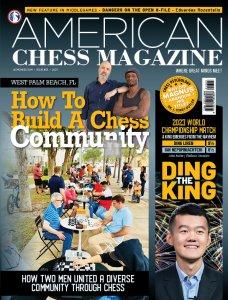American Chess Magazine - 32

American Chess Magazine #32: More Than Meets The Eye
In an exclusive interview, Alexandra Botez reveals her story of determination, talent and challenges she has faced as a woman in both the chess and streaming worlds. Alexandra Botez started playing chess at the age of six, after which she soon won her first national tournament and then later progressed to represent Canada at Chess Olympiads, while simultaneously continuing her studies at Stanford University.
Descrizione
American Chess Magazine #32: More Than Meets The Eye
In an exclusive interview, Alexandra Botez reveals her story of determination, talent and challenges she has faced as a woman in both the chess and streaming worlds. Alexandra Botez started playing chess at the age of six, after which she soon won her first national tournament and then later progressed to represent Canada at Chess Olympiads, while simultaneously continuing her studies at Stanford University. At the age of 16 she entered the world of creating chess content with her Facebook page, but did not give priority to her talent in this field until 2019 when she became one of the earliest chess streamers, albeit with initially only about 50 viewers. Interviewed by ACM Features Editor, FM Alec Getz, Alexandra chronicles what then followed – truly an inspiring and challenging journey that has resulted in her becoming a social media sensation with more than two million subscribers across platforms! Elite grandmaster Levon Aronian has recently won the super-strong WR Chess Masters in Dusseldorf and in style – as shown by his exclusive and even witty game annotations for ACM. Here he offers readers useful advice prompted by the positive changes he has made to his own approach to chess and which have brought him renewed success. Then, in a short interview that follows, he continues in the same vein, sharing further details of this new stage in his life – during which he has migrated from Armenia to the United States and boosted his motivation to participate in future competitions. From the same tournament, GM Emilio Cordova has prepared an overview of his favorite opening choices, ranging from the sharp Benko Gambit to the seemingly quiet Petroff Defense. Even readers whose opening repertoire differs from this selection will surely enjoy and benefit from the useful advice Emilio gives on how to approach the study of chess openings. Then GM John Burke follows with a report on the 2023 American Cup held in Saint Louis, where current U.S. No.1 player, GM Hikaru Nakamura, again demonstrated his complete set of skills in classical, rapid and blitz – to clinch the title after a memorable trilogy against his many-time rival Wesley So. In his customary style, Burke highlights the most interesting moments of this unusual tournament which has now become something of a tradition. In his regular column, GM Sarunas Sulskis annotates three notable games that caught his eye. First comes the encounter from Wijk aan Zee in which the tournament winner Anish Giri manages to outplay the fast-rising Indian youngster Gukesh after employing a strong opening novelty. The second game between world No.1 Magnus Carlsen and the elite GM Richard Rapport, features a fearless king walk that was announced as early as move 11. Carlsen’s novelty was supported by deep positional understanding and a couple of surprising, yet provocative decisions in the middlegame which left a strong impression on the author and fully justified his choice of this game for publication. The third game in Sulskis’ selection is a breathtaking battle between two Indian prodigies – Gukesh and Praggnanadhaa – which featured some incredible tactical blows in which White had the last laugh. GM Jacob Aagaard’s masterclass offers a new set of a dozen challenging positions, inviting readers to share a training session together with his best student – one of the top American grandmasters, Sam Shankland. The examples are divided equally into two categories – tactics/calculation and strategy/positional play. Can you do better than Sam?! Another exclusive article comes from the hand of newly crowned European Champion, GM Alexey Sarana. In a very personal narrative, Sarana explains how he was able to carry out his dream strategy designed for Open Swiss tournaments – “win with White, draw with Black.” And this was not just any tournament, but a 484-player competition with 373 FIDE titled players! In addition, Alexey highlights the turning point in his career, and how he has now become a completely different player and entered the world’s top 50. The 2023 European Championship was replete with instructive games and GM Nikola Nestorovic offers a number of small chess lectures, accompanied by six examples for readers to solve, based on real-game positions from this event. A new column dedicated to middlegames comes from GM Illia Nyzhnyk. In this first instalment, Nyzhnyk deals with a key element when evaluating chess positions – king safety. After providing illustrative examples from tournament play, he then challenges readers to solve three positions from practical play, using their new-found knowledge obtained from his lecture. ACM regular endgame expert, GM Alex Fishbein, this time reveals the mystery behind the endgame mastery of the third world champion, Jose Raul Capablanca. What was Capa’s main strength – the endgame or the middlegame? Was Capa’s endgame intuition inherited by Anand, Karpov and Carlsen? How significant is Capa’s legacy? Younger generations of readers might not be familiar with the achievements of American chess legends from yesteryear, so American Chess Magazine aims to revive these glorious names for a wider audience. IM Sal Matera certainly deserves this honor, being the 1967 U.S. Junior Champion and former member of the American Student Olympiad team – and even today President of the Marshall Chess Foundation and member of the Board of the Marshall Chess Club. Matera’s long chess journey is here thoroughly documented by Joshua Anderson. We start another new column in this issue by unlocking a treasure trove containing a unique database of American chess games which, for the most part, have remained unpublished over the years and are not readily available elsewhere. These games have been compiled over decades by renowned bibliophile Andy Ansel and are now published exclusively in ACM with instructive annotations by our Senior Editor, Pete Tamburro, who also adds relevant historical context. Cheating in chess was the biggest story towards the end of 2022, and provoked a huge amount of discussion worldwide. Dr J.Corey Butler, Professor of Psychology at Southwest Minnesota State University, delves into this topic, analyzing its motives and social impact. He also draws conclusions from results of various research studies and the importance of educating new generations from an early age in the hope they will resist the temptation to cheat. Similarly, financial expert Luca Barillaro deals with the same topic, whilst comparing the worlds of chess and finance and stressing the importance of the decision making process, as well as offering suggestions which give more power to referees. As usual, Jon Edwards presents the latest chess tech developments, this time focusing on innovations in engines, databases and literature. Then FM Grayson Rorrer presents an overview of tournament results from events held in both the U.S. and abroad, accompanied by annotations of some interesting games that caught his eye. For fans of chess fiction, we then present a story written by Greg Jenkins, after which FM Carsten Hansen follows with his reviews of ten newly published chess books. To conclude ACM issue #32, our guest speaker in 5x5 Q&A is GM Alexander Ivanov, the 1995 U.S. Champion and four-time World Cup participant.
Informazioni
- Marca American Chess Magazine
- Codice acm32
 Italiano
Italiano
 English
English



